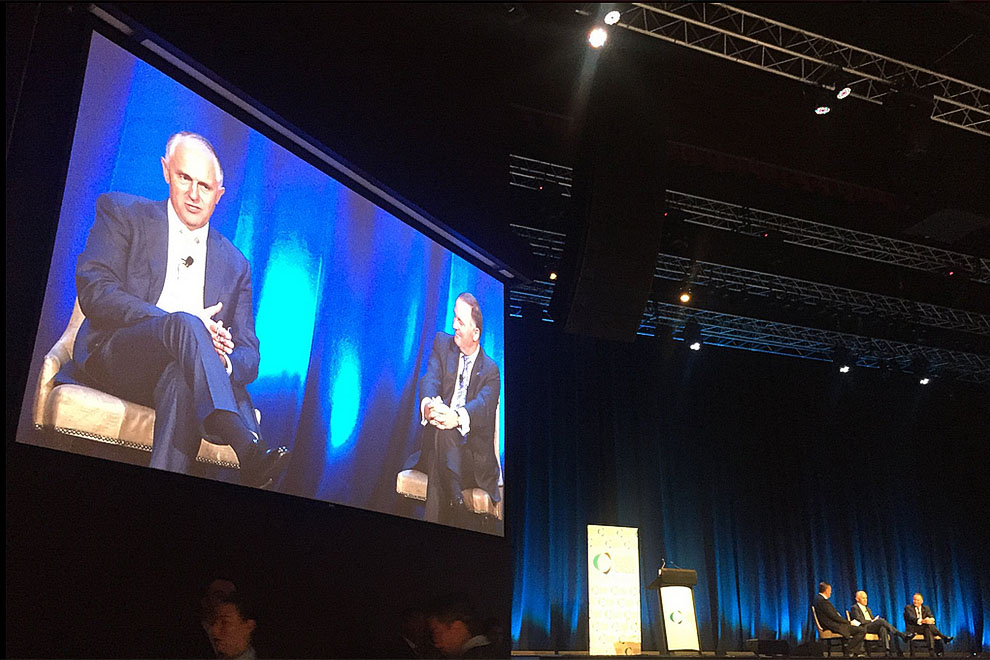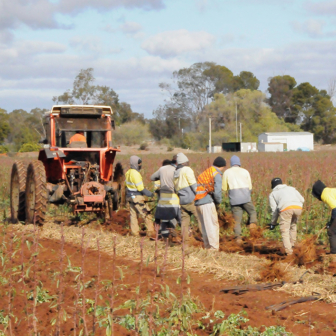When he announced a conditional pathway to citizenship for New Zealanders last Friday, Malcolm Turnbull was attempting to soothe a persistent irritant in trans-Tasman relations. Rather than offering a proper remedy, though, he has added a new layer of complexity and discrimination to an already messy and unfair policy.
Tens of thousands of Australian-based New Zealanders do stand to gain from Turnbull’s new visa pathway. They must already live in Australia, satisfy health and character tests, and be able to show that they have paid tax on an income of at least $53,900 for five or more years. From 1 July next year, they will be able to gain permanent residence via the skilled independent category of the migration program. They can take the next step to citizenship after living in Australia for a further twelve months.
NZ prime minister John Key reckons up to 100,000 Australian Kiwis could take advantage of the new visa pathway, while the Department of Immigration and Border Protection offers a lower estimate of 60–70,000.
Making the transition to permanent residence will have a material impact on the lives of many New Zealanders, and offer them increased security and greater peace of mind. When they arrive in Australia they are granted a special category visa that enables them to live and work here indefinitely. They can also access Medicare, but they are denied most other forms of government assistance. If they fall on hard times, they can’t get unemployment benefits, youth allowance, sickness benefits or special benefits.
New Zealanders are required to pay levies for the National Disability Insurance Scheme but don’t have access to any of its services. NZ women who leave an abusive partner will find that domestic violence services can offer them only limited assistance. Refuges often require residents to be in receipt of specified Centrelink payments, which New Zealanders aren’t entitled to even if their children are Australian citizens. Securing longer-term housing requires evidence of some source of income, a requirement many New Zealanders can’t meet without access to government benefits. Even returning to New Zealand may not be an option, since a mother can’t legally take her children out of Australia without the consent of the father.
The children of New Zealanders who want to go on to tertiary study after school (or mature age New Zealanders who want to upgrade their qualifications) must pay upfront fees for university; they are excluded from the Commonwealth’s income-contingent Higher Education Loan Program. Fees are charged at the same rate as for domestic students, not at international rates, but for many people the financial barrier to study is still insurmountable. (A limited exception has been in place since the start of 2016: New Zealanders qualify for the concessional loans scheme if they arrived in Australia as “a dependent child aged under eighteen” and “have been ordinarily resident in Australia for the previous ten years.”)
Australians who move to New Zealand quickly gain more or less the same rights and responsibilities as locals. They can enrol to vote after living across the Tasman for just one year, and they can apply for a permanent residence visa after two years, which makes them eligible for welfare payments including unemployment benefits and student allowances. They can become citizens after five years.
New Zealanders who arrived in Australia prior to 2001 were treated in a similar way. They essentially had the same status as permanent residents and could access welfare payments after the relevant qualifying period. Since the Family and Community Services Legislation Amendment (New Zealand Citizens) Act 2001 came into force, however, New Zealanders have been treated very differently. They are denied access to government payments, regardless of how long they live here. Unless they are in an ongoing relationship with an Australian and can qualify for a partner visa, the only way to make the transition to permanent residence is as a skilled migrant. Until now, this required employer sponsorship and/or qualifications in an occupation deemed to be in demand in the Australian economy. Many New Zealanders could not meet this threshold, and were rendered, in effect, indefinitely temporary – allowed to live, work and pay taxes in Australia, but excluded from most forms of government support, and from becoming full members of the political community.
It is hard to be sure exactly how many New Zealanders are stuck in this situation. According to immigration department statistics, there were 661,550 New Zealanders in Australia on special category visas on 30 September 2015, but since every New Zealander who enters Australia is granted the same visa on arrival, this figure includes people here on short trips (who probably number more than 100,000). It also includes New Zealanders who were granted special category visas before the 2001 restrictions came into force and whose status as quasi-permanent residents is “protected” in legislation. Nevertheless, it’s estimated that between 200,000 and 250,000 Australian Kiwis could be long-term settlers who migrated after 2001.
As John Key put it in his joint media conference with Turnbull, these New Zealanders live in Australia “in a particular category that hasn’t allowed them to become Australian citizens.”
Turnbull’s announcement changes things by offering a lower threshold for New Zealanders to qualify as independent skilled migrants. From 1 July 2017, New Zealanders will have an additional pathway to permanent residence if they “have been living in Australia for the past five years, and have earned income at or above the Temporary Skilled Migration Income Threshold (TSMIT) as evidenced by their Australian Taxation Office Notice of Assessment throughout their qualifying residence period.”
The TSMIT is a legislative instrument used to set the minimum salary that can be paid to a temporary migrant worker on a 457 visa. It is intended to indicate “that an occupation is skilled and to ensure that a visa holder has reasonable means of support whilst in Australia.” The thinking behind using the TSMIT as a benchmark for New Zealanders to qualify for permanent residence thus appears to be twofold. First, it makes sure that they are filling skilled vacancies in the labour market, rather than taking entry-level jobs that Australian job-seekers could do. This lacks logic, though, because New Zealanders on low incomes can still live and work in Australia indefinitely under the Trans-Tasman Travel Agreement. They will continue to fill the jobs they hold whether they do so as permanent residents or special category visa holders. Second, using the TSMIT as a salary threshold appears to be designed to ensure that New Zealanders who become permanent residents have sufficient income to meet their needs without government support. Again, this lacks logic: there is no reason to expect New Zealanders on lower incomes who have been living in Australia for five years without accessing government benefits to turn into “Bondi bludgers” the moment they get permanent status.
What the new policy does is penalise New Zealanders engaged in low-paid work. The “occupation matrix” in the Department of Employment’s annual overview of the labour market, Australian Jobs 2015, shows that the median full-time salary for many occupations falls below the current TSMIT threshold of $53,900. A quick scan of just the job headings from A to C reveals that New Zealanders who work as bakers, bar attendants, baristas, beauty therapists, bricklayers, cafe workers, car detailers, care workers (in child, aged, disability, personal or nursing care), checkout operators, cleaners, clothing trade workers and cooks may all struggle to meet the required salary threshold for Turnbull’s new path to residency.
Those who don’t earn enough to walk down the new pathway to permanent residence are more likely to be Kiwis of Māori or Pacific Islander heritage than Pākehā (New Zealanders of European descent). An analysis of the 2011 Australian census by University of Waikato researchers Tahu Kukutai and Shefali Pawar shows, for example, that less than half the NZ-born Māori in Australia of “prime working age” (between twenty-five and fifty-four years of age) had successfully completed Year 12 and only 40 per cent had a post-secondary qualification (compared to 60 per cent of non-Māori migrants from New Zealand). The labour market participation rate of New Zealand–born Māori is high – for Māori men, the employment rate was nearly three per cent higher than the Australian average – yet Māori are disproportionately concentrated in lower-skilled jobs, with four out of ten working as labourers, machinery operators or drivers. The intent of the new visa pathway may not be discriminatory, but its effect almost certainly will be.
The policy also disadvantages those who work part-time and don’t earn enough to meet the salary threshold because they care for children or other family members; and the health requirements will exclude many people with a disability or chronic illness. In its report on the Turnbull–Key announcement, New Zealand’s One News profiled Sydney Kiwi couple Kirk and Angela Bensemann, whose seven-year-old Australian-born son Toby has been diagnosed with autism. Although they have lived and worked in Australia since 2007 and meet the $53,900 earnings threshold, the Bensemanns anticipate that their son’s disability will render them ineligible for permanent residence on health grounds.
The immigration department says that the additional visa pathway to permanent residence is for New Zealanders who have “shown a commitment and contribution to Australia.” The implication of this statement is that childcare workers or cooks or single parents who work part-time and earn less than $53,900 per year, or families like the Bensemanns with a disabled child, are somehow lacking in commitment to Australia or failing to make a contribution to the nation.
Curiously, the new policy has also been time-limited: only those who were already living in Australia at the time of the announcement on 19 February 2016 can take advantage of the new pathway. Turnbull says that New Zealanders who arrive in the future who “wish to become Australian citizens, have got many other visa categories to use.” Put plainly, this means that future settlers from New Zealand will be subject to the same rules that have applied since 2001 and so will risk being caught in the same visa trap identified by John Key as the source of the problem Turnbull is supposedly trying to address: they will be living in Australia “in a particular category” that does not allow them “to become Australian citizens.”
In recent years, the unfair treatment of New Zealanders in Australia has become a major political issue across the Tasman, inflamed in the past twelve months by the impact of new character laws that resulted in the detention and deportation of hundreds of New Zealanders who have served time in Australian jails (even when they grew up here as children and are Australian in all aspects of their lives apart from their passports). The rights of New Zealanders in Australia is a perennial issue at annual talks between the two prime ministers, and John Key is the first NZ leader since 2001 to return home after securing a significant concession from Australia.
This may dampen protests about the treatment of New Zealanders in Australia for a time, but lobby groups like Oz Kiwi show no sign of giving up the fight. More stories are sure to emerge of Kiwis who fall on the wrong side of the new rules because they don’t earn enough money or have a health problem, and over time a new cohort of disenfranchised post–February 2016 arrivals will build up. Nor does Turnbull’s half-measure resolve an underlying problem of principle about the rights and entitlements of people in a democracy. If New Zealanders live in Australia long-term, abide by the law and pay taxes, is it ethically acceptable to deny them government support indefinitely and to permanently exclude them from the political life of the nation? It’s certainly inconsistent with the egalitarian ideals and democratic principles that Malcolm Turnbull himself espouses. •




